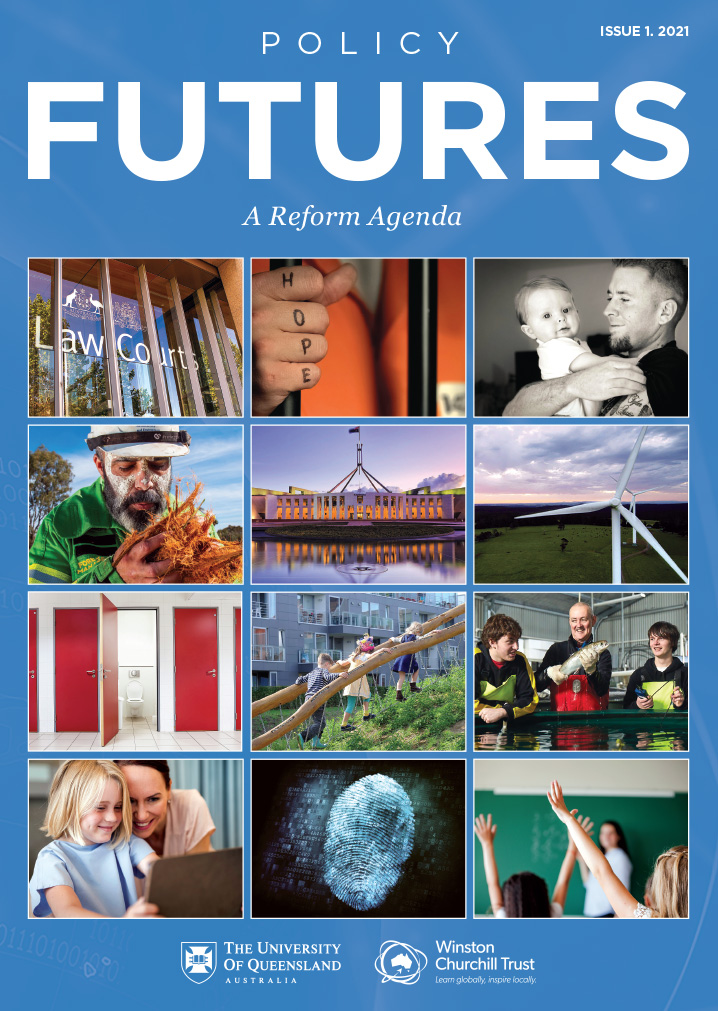 CPF and The Winston Churchill Memorial Trust formed a partnership to increase the impact of outstanding Churchill Fellows and their findings, through the Policy Impact Program (PIP).
CPF and The Winston Churchill Memorial Trust formed a partnership to increase the impact of outstanding Churchill Fellows and their findings, through the Policy Impact Program (PIP).
PIP identified, curated and advocated a selection of ideas from Churchill Fellows that have the potential to shape best practice and policy reform on a variety of relevant and contemporary issues facing Australia.
In 2020, 11 Churchill Fellows were selected to join the program to work alongside leading policy analysts to assess the policy implications of their work and develop their policy ideas into an article for the annual publication Policy Futures: A Reform Agenda. In March, 2021, these Churchill Fellows were invited to the inaugural Churchill Policy Room at Parliament House in Canberra where they met with Parliamentary Ministers, policymakers and advisers to discuss their topics.
- Jennifer Bowles (VIC 2014) What can be done: Mandated residential therapeutic treatment for young people suggesting substance abuse/mental illness.
- Owen Churches (SA 2018) Fairness and accountability in the use of government decision-making algorithms.
- Jessica Cocks (NSW 2016) Families and communities matter – building a more inclusive and responsive child protection system.
- Scott Falconer (VIC 2017) Ethical collaboration and partnership – returning cultural fire to country in Victoria.
- Megan Gilmour (ACT 2016) Systemising school connection for seriously sick kids
- Steven Harrison (TAS 2015) Changing senior secondary school culture to enhance vocational education and training outcomes and pathways with industry.
- Natalia Krysiak (NSW 2018) Design and policy for child-friendly high-density living.
- Taryn Lane (VIC 2017) Models for community-led transitions to zero-net emissions.
- Katrina Marson (ACT 2018) Ignorance is not innocence: safeguarding sexual wellbeing through relationships and sex education.
- Claire Seppings (VIC 2015) An innovative approach to the recidivism dilemma through the expertise of ex-offenders.
- Katherine Webber (QLD 2018) Prioritising public toilet policy and planning to improve access and inclusion in public places.
Following a rigorous selection process, PIP Fellows were provided with opportunities to develop their skills in policy and governance, identified and engaged with relevant government leaders, extended their networks, and learnt how to improve the context-specificity of their findings.
With the combined strengths and convening power of the Churchill Trust and CPF, the PIP Fellows gave their perspectives via a national platform.
Benefits for PIP Fellows
- Increased the impact of their Fellowship project and on-going work
- Increased their profile via media coverage, editorial distribution, social media, and opportunities to meet with (or present to) policymakers and government agencies
- Networked with and received mentoring from leading policy experts
- Free policy training through CPF's ‘Getting Research into Policy and Practice (GRiPP)’ workshop
- Developed their policy ideas into an article for the annual publication Policy Futures: A Reform Agenda
Visit The Winston Churchill Trust for more information.
